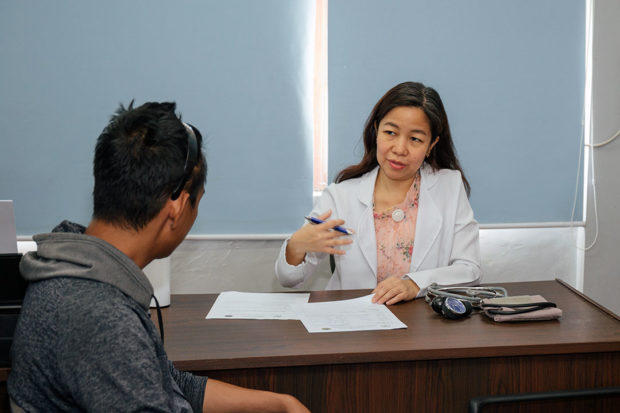Embracing change, transforming lives through Community-Based Drug Rehabilitation
Jennifer Alejandro, MD, is Chief of the Anti-Drug Abuse Council of Pateros City, a project site of URC’s USAID RenewHealth – Expanding Access to Community-Based Drug Rehabilitation (CBDR) Project in the Philippines.
Doc Jen, as she is called, is accredited with the Department of Health to perform drug dependency examinations to determine the level of addiction and mental health issues of persons who use drugs (PWUDs).
The government’s anti-drug initiatives created pressure for people to “surrender” for treatment. The volume of clients and the lack of accredited doctors is a challenge for Doc Jen but it is a challenge she has embraced.
“Addiction is a medical condition, so as a physician, I feel that I have a role to play in treating this condition,” said Doc Jen. “I find fulfillment in the work I do specially when I see how a patient recovers and how his or her family changes and they all become productive members of our community.”
Overcoming Stigma to Get Users into Treatment
Beyond her role as a doctor, for the past four years Doc Jen has been in charge of the Anti-Drug Abuse Council of Pateros City. This office provides services to drug users seeking rehabilitation, a task made even more challenging given the stigma and discrimination faced by clients and their families.
“I believe that changing behaviors of PWUDs and their family members is key in increasing access to CBDR services. Many of my patients go to treatment out of fear of reprisals from enforcement authorities. Many also resist treatment due to stigma and discrimination against persons who use drugs in the community,” says Doc Jen.
The USAID RenewHealth Project is helping address this challenge by providing technical support in the creation of evidence-informed and culturally-appropriate social and behavior change communications (SBCC) actions that seek to motivate PWUDs and their families to seek treatment.
Survey: Family Support, Self-Motivation Key to Overcoming Drug Use
In 2019, the project conducted interviews with PWUDs and their family members as part of a SBCC formative assessment. Surveys measuring stigma and discrimination, barriers to treatment, and media preference were collected to better understand how to best reach prospective clients and families and to share the information with providers as a resource.
Results indicated barriers to treatment include stigma and discrimination. Although fear influenced some to seek treatment, it is often not enough to keep clients in the program. Ultimately, it is self-motivation and family support that are the major enablers to change.
The data collected was presented in a SBCC virtual three-week workshop that began on April 29 and culminated on May 15, 2020. Attended by Doc Jen and other Anti-Drug Abuse Council chiefs, the workshop aimed to create a SBCC Framework and Plan for CBDR in the Philippines.
‘Motherly’ Patrols Help Reduce Drug-related Crimes
At the workshop, participants shared best practices. For example, Pateros City has mobilized faith-based organizations to provide CBDR treatment. And to make their community safe, they have enlisted women patrollers, or Ronda ng Kababaihan. The patrols are composed of mothers and grandmothers, who, after seeing the community experience, seek to avoid more drug-related crimes. The women patrol the barangays from 10pm until 4am with flashlights as their only defense. Their “motherly” approach is reported to work better than having male patrollers. Since 2017, having these women patrol the neighborhoods has contributed to a decrease in the crime rate in Pateros.
Doc Jen believes that initiatives such as these send a powerful message that can help change attitudes and behaviors of not just PWUDs and their families but also community members.
“We need to continue providing CBDR because my vision is those who recovered can be advocates in the future,” said Doc Jen. “They can be the face of our campaign, share their stories of their journey towards recovery, and provide inspiration to communities to counteract the stigma and discrimination associated with drug use.”
To learn more about the CBDR, you can visit https://www.facebook.com/BawatSimulaCBDR/
ADVT
